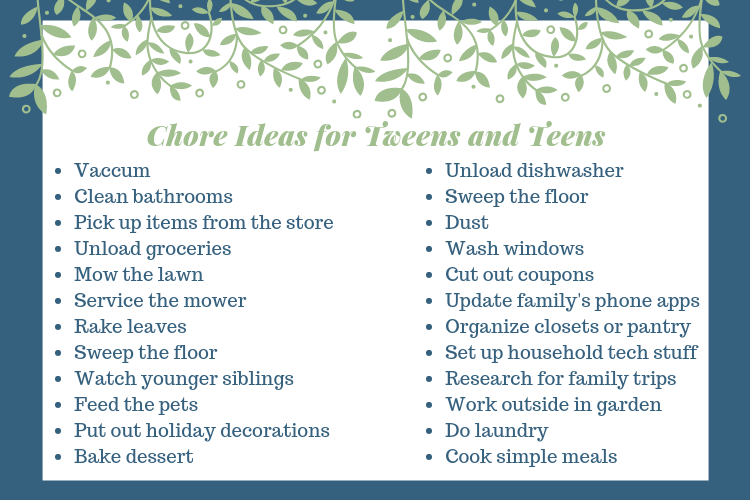“Mama!”, called out 12-year-old Ndiiva excitedly.
“Yes?”, Mama answered in an enquiring tone.
“I know what I want for my 13th”, Ndiiva squealed excitedly. “I want a dog; I want a pet dog!!”. His eyes were glistening with excitement, like a puppy that’s seen its first meal of the day.
“Well…,” Mama begins to say with a very measured tone…’how do you propose to take care of a dog, another living thing, when you haven’t been tending to your plants in the garden frequently?”

Chores Ideas for Tweens Phot Credit -Pinterest
“Oh Mama, I will take care of the dog myself, I promise. I will feed it, bathe it and pick up after it when it poops. I already read about taking care of pets and I know I can do it”, Ndiiva gushed out hurriedly.
“Really?”, asked Mama, in a mock-surprised tone. “You can take care of a dog all by yourself, but you can’t wake up early enough to water your plants? Or make your bed when you wake up? Or wash your own plate and cutlery after eating? And aren’t you the one who keeps losing your water bottle every 2 weeks at school?”
Ndiiva looked at his mother, perplexedly. “But what have these got to do with me getting a dog?” “It’s not as if I am taking the dog to school – I can’t.” “And the dog’s plate doesn’t need washing as they lick their plate very well after eating, Mama”. He was certain he had won his mother over with her arguments because his mother kept smiling at her.
“My dear son Ndiiva, welcome to the concept of responsibility, for it is said that, to whom much is given, much is required of them”.
Do you see Ndiiva’s mother’s point? No? Then oblige me as I try to break it down. Being responsible is a very mature thing to do and since as a tweenager, you want your parents to treat you not like a ‘kid’ anymore, then the sure way is to be mature in your ways.
Merriam Webster dictionary defines responsibility as, “able to answer for one’s conduct and obligations: trustworthy”. It gives us another definition of the same word as, “able to choose for oneself between right and wrong”. I love both definitions as they are so apt about what being responsible is.
What can you do to be responsible at home or school so your parents and teachers can trust you with more responsibilities?
- Think ahead– what needs to be done around the house next week? Is the hedge overgrown and needing tending to? Are there some bulbs that are out and need replacing? Is the water in the dispenser about to finish? You can write down all things you have noticed that need attention (and which you may not be able to do yourself) and talk through them with your parents (at a time when they’re not busy or visibly stressed). They will find it helpful and very responsible of you.
- Care for your belongings and others’– Anything you own is and was purchased with money that your parents worked very hard for. It is the ultimate height of irresponsibility to lose them constantly or not take good care of them. When you are able to care for your own things properly, you will have no problems taking care of other people’s things because you have a sense of value.
- Stick to the plan– Let’s say you always miss your assignment deadline, and your Teacher comes to an agreement with you, you must stick to the plan. If you later realise the plan doesn’t work for you, go back to them (in good time, not on the day you were to present your assignment) to make a case for changing the plan, but make sure your case is compelling and reasonable. Be prepared to be told ‘No’ by your Teacher (because your suggestion may not suit their work schedule); so, you have to stick to the original plan.
- If you mess up, ‘fess up– no one is perfect, and we all drop the ball every now and then in life. The responsible thing to do is to accept your fault, apologise and go the extra mile to ensure you correct the ‘mess’ you created; more importantly, you cannot repeat that mistake ever.
Trust me on this, people. Take these steps I am suggesting (and any others you can think of) and see how quickly the adults in your life begin to trust you and your sense of responsibility, which in turn leads to them obliging some ‘unusual’ requests you make of them.










